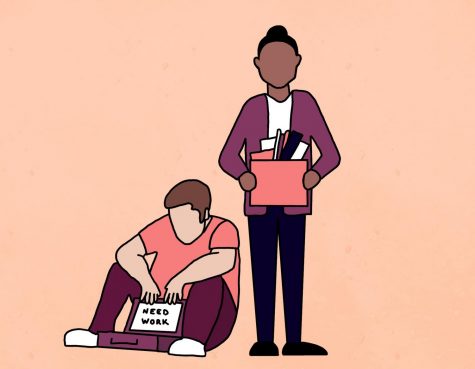Economic hardship strikes SPU students
COVID-19 shutdowns force many SPU students into uncomfortable financial situations
May 6, 2020
In the last six weeks, the United States has seen 30.3 million unemployment claims, according to NPR. This number shatters the previous unemployment records set during the great recession of the late 2000s.
This has left the American public disoriented and looking for answers. Seattle Pacific University students and families are not exempt from this number, and there are a number of students within the SPU community who are caught in the whirlwind of this economic crisis.
Javier Ramirez is a sophomore at SPU. Throughout his time at college, he has worked hard to pay his own tuition, while helping out his parents back home.
“My first two years here at SPU, I had to work full time due to the overwhelming economic pressure at SPU with its high tuition cost,” Ramirez said in a text message.
“My parents tried to help at the beginning but we come from a very poor background and in fact I ended up having to help pay the mortgage as well as paying tuition myself.”

The coronavirus shutdowns have made an already unstable economic situation much worse.
“This COVID-19 crisis has hit the world and our problems have multiplied and expanded 10 times worse,” Ramirez said. “I lost my job, my mother lost her job and my father barely held onto his job.”
“We lived our lives like we already were in a crisis. Now that there is a world crisis we are starting to be forgotten.”
Ramirez and his family are not the only representation of economic hardship that has been brought to SPU by the coronavirus shutdowns.
“My dad lost his job,” freshman Madeline Allison wrote in a text message. “Now it’s all on my mom which puts a strain on her because she works 24/7 in health care, making medical devices.”
Allison believes that cases like her family’s could become much more prevalent in the United States if the lockdowns continue.
“People are losing their jobs, like my Dad, who are too old to get new ones when this is over,” Allison said. “Now, my Mom has to pay for my sister and I go to college which is crazy and stressful.”
The economic toll of COVID-19 has split the American public in the last few weeks. While many still support the lockdowns in order to protect the public health, a growing swath of Americans are demanding that the government reopens the economy as soon as possible.
While at least 28 states will have formally relaxed their lockdowns by May 11, protests have broken out in many other states who have decided to be more cautious. SPU students who are struggling to make ends meet share much of this frustration.
“Only a lucky few who had the resources, the savings, the opportunities — only they will survive if this goes on much longer,” Ramirez said.
Many Americans are also frustrated that the lockdowns may have done more harm than good.
“I think the government is stretching its power a bit too far, because the virus is still spreading despite the lockdown,” Allison said.
“The economy is going to take years to recover from this, but what people don’t understand is there will be another outbreak, this isn’t going to go away. We can’t keep people locked down forever so now is the time to open the country and get people back to work.”
According to Worldometers, which keeps a running total of coronavirus cases and deaths from all across the world, the U.S. has seen over 1.1 million cases of COVID-19 since the disease has reached its shores. This has resulted in over 67,000 deaths.
So far, leaders have used lockdowns as weapons against spread on COVID-19, but with businesses shattered and many unemployed, Americans are eager for new solutions that can protect public and economic health.



























































































